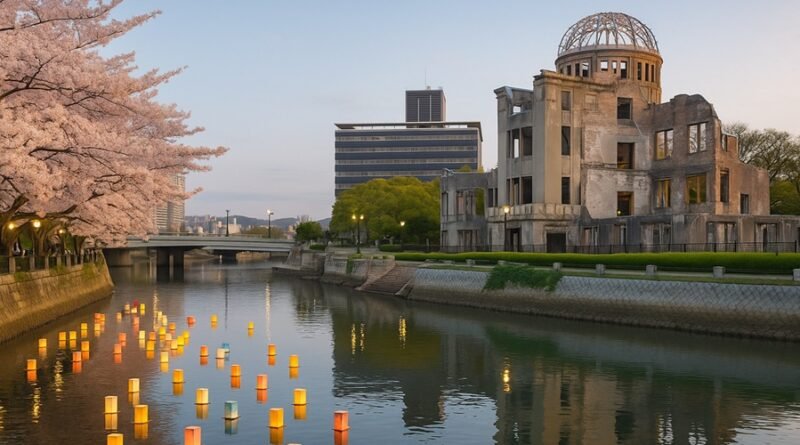Hiroshima Day 2025: Remembering the Tragedy, Honoring Peace
Introduction
Hiroshima Day, observed annually on August 6, commemorates one of the darkest chapters in human history — the atomic bombing of Hiroshima, Japan, in 1945 during World War II. This day is not just about mourning the devastating loss of life; it is a global reminder of the horrors of nuclear war and a call for peace, disarmament, and international cooperation.
As we mark Hiroshima Day 2025, it’s more important than ever to reflect on the past and renew our collective commitment to a peaceful and nuclear-free world.
Historical Background: The Atomic Bombing of Hiroshima
Why Was Hiroshima Targeted?
Hiroshima was selected as the first target of the atomic bomb because of its military and industrial significance. It was a vital command center for the Japanese army and had not been significantly damaged during previous bombing raids, making it an ideal test location for the devastating power of the new weapon.
The Bomb: ‘Little Boy’
On the morning of August 6, 1945, at exactly 8:15 AM, a U.S. B-29 bomber named Enola Gay dropped an atomic bomb nicknamed “Little Boy” over Hiroshima. Within seconds, the city was engulfed in a blinding flash, followed by a massive shockwave and intense heat.
Immediate Aftermath
- Approximate deaths: 70,000–80,000 people died instantly.
- Total casualties by the end of 1945: Over 140,000 people, due to radiation sickness, burns, and injuries.
- Destruction: Around 70% of the city was destroyed.
- The survivors, known as Hibakusha, suffered long-term effects, including cancers, deformities, and psychological trauma.
The Global Significance of Hiroshima Day
A Day for Peace and Reflection
Hiroshima Day is not limited to Japan. It is observed across the world as a day of remembrance, anti-nuclear advocacy, and promotion of peace. On this day, people gather to:
- Hold memorial services for the victims.
- Light peace lanterns and float them on rivers.
- Organize peace marches, discussions, and educational events.
- Reaffirm commitments to nuclear non-proliferation.
Symbol of Nuclear Horror and Hope
Hiroshima has become a universal symbol — not just of destruction, but also of resilience and hope. The Hiroshima Peace Memorial (Genbaku Dome), now a UNESCO World Heritage Site, stands as a haunting reminder of the bomb’s impact and a global monument for peace.
Why Hiroshima Day Matters in 2025
Nuclear Tensions Today
Despite decades of treaties and diplomatic efforts, the world is still home to over 12,000 nuclear weapons. Rising geopolitical tensions, including:
- Strained U.S.-China relations
- North Korea’s missile testing
- Ongoing conflicts in Ukraine and the Middle East
… all threaten to reignite the nuclear arms race. Hiroshima Day 2025 calls on global leaders to:
- Reduce nuclear stockpiles
- Recommit to the Treaty on the Non-Proliferation of Nuclear Weapons (NPT)
- Support the Treaty on the Prohibition of Nuclear Weapons (TPNW), which came into effect in 2021
Climate Change and Nuclear Risks
The intersection of climate change and nuclear risk is also gaining attention. Natural disasters could destabilize nuclear facilities, while conflicts over resources might escalate into nuclear threats. Hiroshima Day encourages us to see these challenges as interconnected and to act urgently.
Hibakusha: The Survivors and Their Legacy
Voices of Resilience
The Hibakusha (survivors of the atomic bombings) have played a pivotal role in global anti-nuclear movements. Their testimonies offer:
- Firsthand accounts of unimaginable suffering
- Moral authority in the call for disarmament
- Educational narratives for younger generations
Organizations like Peace Boat and the Hiroshima Peace Memorial Museum work with Hibakusha to share their stories worldwide.
Aging Generation
As the Hibakusha age, preserving their experiences through recordings, museums, and education has become critical. Their voices must continue to echo through history.
Commemorative Events in Hiroshima and Worldwide
In Hiroshima
- Peace Memorial Ceremony: Held at Hiroshima Peace Memorial Park, attended by Japanese officials, foreign diplomats, and survivors.
- Peace Declaration: The mayor of Hiroshima delivers a powerful speech urging nuclear disarmament.
- Bell of Peace & Moment of Silence: At 8:15 AM, the exact time of the bombing, people observe silence and ring the Peace Bell.
- Floating Lantern Ceremony: Thousands of lanterns are floated on the Motoyasu River in honor of the victims.
Around the World
- Schools and colleges host peace education programs
- NGOs organize anti-nuclear demonstrations
- Faith groups conduct prayers for peace
- Digital campaigns spread awareness on social media
Quotes and Messages for Hiroshima Day
“The only way to win an atomic war is to make sure it never starts.” – Omar N. Bradley
“Hiroshima teaches us that peace is not merely the absence of war but the presence of justice, equity, and respect for life.” – Unknown
“Those who cannot remember the past are condemned to repeat it.” – George Santayana
How You Can Participate in Hiroshima Day 2025
- Attend a Peace Vigil in your city or online.
- Watch documentaries like White Light/Black Rain, Hiroshima: Out of the Ashes, or Barefoot Gen.
- Educate others through blog posts, social media, or community events.
- Support disarmament organizations like ICAN (International Campaign to Abolish Nuclear Weapons).
- Write to leaders urging nuclear disarmament policies.
Conclusion
Hiroshima Day is more than a remembrance — it’s a call to conscience. As we move deeper into the 21st century, our technological advancements must be matched by our moral progress. The story of Hiroshima must not be reduced to a chapter in a textbook; it should be a living lesson etched into the soul of humanity.
On Hiroshima Day 2025, let us not just look back in sorrow, but look forward with purpose — to create a future where peace triumphs over war, dialogue over destruction, and compassion over conflict.

